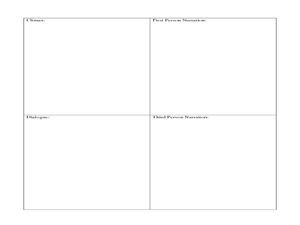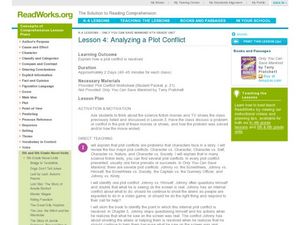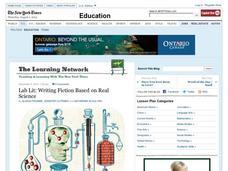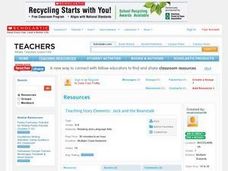Curated OER
Elements of Fiction
A wide variety of information regarding the elements of fiction is presented in this PowerPoint. Viewers are directed to trace their hand on a blank piece of paper and label each finger with one of the 5 elements of fiction. Additional...
Curated OER
Elements of Fiction
The metaphor of a pot of soup and a series of colorful templates remind young writers of the elements that make for a rich story. Pepper the plot with carrot/character, potato/point of view, corn/conflict, tomato/theme, and season with...
Curated OER
Discovering Language Arts-Intermediate Fiction
Explore the elements of science fiction. Students investigate the literary elements present in science fiction and write their own science fiction stories.
Curated OER
Illustrating the Elements of a Story
Explore the elements of a story with this two-page graphic organizer. Readers write and draw descriptions of each element, including setting, plot, conflict, rising action, climax, dialogue, and narration.
Houghton Mifflin Harcourt
Core Analysis Frame: Fiction
Dig into any piece of fiction with a series of analysis questions. There are two levels of questions provided: basic and in-depth. The basic questions can be copied double-sided onto a single piece of paper, while the in-depth questions...
Curated OER
Daughters Come of Age in Women's Fiction
Introduce your young readers to fiction written by women authors. For each story, they explore the way these daughters discover and claim their own identities. Individually, class members use the literature to examine their role in their...
Curated OER
Analyzing a Plot Conflict
Sixth graders analyze plot conflict with science fiction and TV programs. After discussing the conflict, they identify solutions for the programs selected. They examine Only You Can Save Mankind for conflict, and consider ways the...
Pittford Schools
Literary Devices, Techniques, and Elements
What's the difference between a speaker and an author? What's an example of anthropomorphism? Clarify the meanings of literary devices, elements, and techniques with a comprehensive glossary of terms.
K20 LEARN
Freedom And Restraint: Elements Of Fiction
Kate Chopin's short story, "The Story of an Hour" and John H. Young's "Our Deportment, or the Manners, Conduct, and Dress of Refined Society" offer high school juniors an opportunity to compare the role of women in the 19th century with...
Curated OER
Lesson Plan 7: The Elements of Story
Budding novelists work on character development by relating to the characters in their stories. They imagine their own hopes and dreams and recall those of characters from books they've read. Learners also consider struggles the...
Curated OER
Identifying Plot Conflicts
Fifth graders identify plot conflicts in the text. In this plot conflict lesson, 5th graders read Dogs Don't Tell Jokes and recognize examples of character vs. self and character vs. character.
Curated OER
Writing Short Stories: The Fun Way
Do your young authors suffer from writer's block when they try to write short stories? Access their natural creativity with C-Gor, the writing monster! The instructional activity takes aspiring authors through a new writing process...
The New York Times
Writing Fiction Based on Real Science - NYTimes.com
Refuse to alienate your scientific-minded young scholars during your creative writing unit. Learners explore how literary writing can reflect observable fact, and be based in actual science. The links include examples of fiction and...
Curated OER
Identifying Science Fiction
Students discuss works of science fiction that they read, highlight aspects that made each a part of science fiction genre, identify formal literary elements, and discuss ways each can be developed through science fiction.
Curriculum Corner
Fiction Organizer
Teach your youngsters about the elements of plot with this handy graphic organizer. Pupils note down the main character, the setting, the problem, and the solution of any fictional story they read.
Curated OER
The Power of Fiction
Students explore fiction that moves individuals to social action. In this literature lesson plan, students read The Jungle by Upton Sinclair and analyze its literary worth as well as its investigative journalism. Students investigate...
Curated OER
Context Clues, Plot Structure, Conflict, and Personal Narrative Essay
What are the elements of a personal narrative? Get your class talking by reading "The Necklace" and "A Dangerous Game." The lesson focuses primarily on defining certain vocabulary terms (like context clues, plot, conflict, climax, etc.)...
Curated OER
What Makes a Novel a Novel?
They always say to write what you know. This approach is used to get middle schoolers prepared to write novels of their own. Using a favorite book as a model, potential novelists respond to prompts that ask about characters, plot, main...
Curated OER
Introduce: Prediction
What will happen next? Leave readers at a cliffhanger as they practice prediction strategies while listening to a story. Pupils start by making guesses based on the book's cover and title, discussing the techniques they use to make these...
Curated OER
Thinking About Theme
Writers use the literary element of conflict to develop their theme. Use the conflict between the Johnny and the ScreeWees in Terry Pratchett’s Only You Can Save Mankind to model how a major theme is revealed. The conflict between the...
Curated OER
Story Problems: Conflict
In this story questions worksheet, students respond to 3 short answer questions that require them to explain what was the problem is in a story, who fixed the problem in the story, and whether they liked the story.
Curated OER
Teaching Story Elements: Jack and the Beanstalk
Middle schoolers define fictional story elements. In this reading comprehension lesson, students read Jack and the Beanstalk and view an included SMARTboard lesson. Middle schoolers use the SMARTboard to match the story element terms...
Curated OER
Understanding Protagonists and Antagonists
How can you tell if a character is a villain? What about a hero? Work on literary analysis with an engaging language arts instructional activity. After completing an activity about the four types of conflict, learners fill out a...
Vanier College
Analyzing Short Stories/Novels
Good questions can help focus readers' attention on the elements writers use to add depth to their stories. The questions on this worksheet do just that and encourage readers to think critically about a story and author's purpose.

























